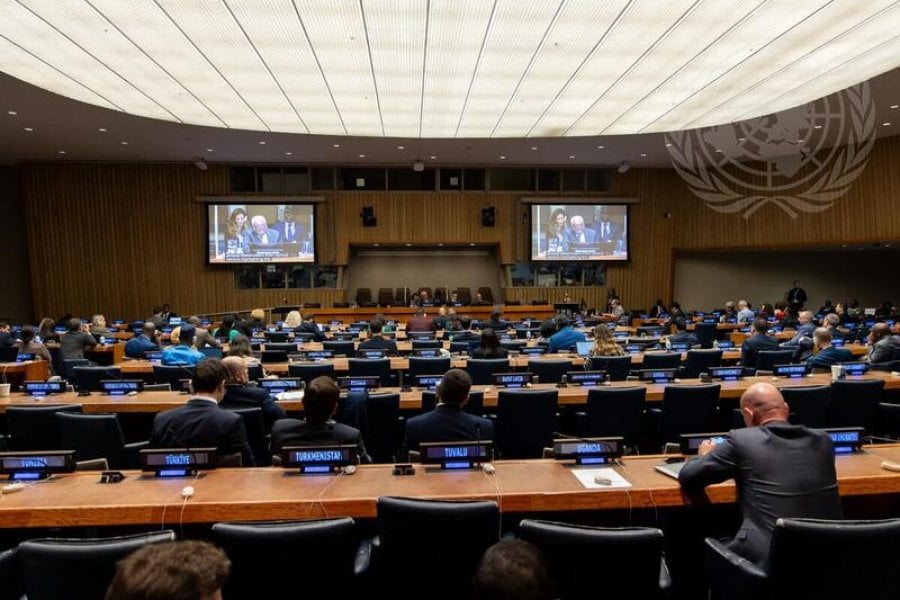
UN General Assembly political declaration on AMR
Unless you have been living under a rock (like some resistant bacteria…), you will have heard about the UN General Assembly’s (UNGA) High-Level Meeting on AMR, which took place on 26th September, and to which organisations around the world have spent the last fortnight responding. But unless you work in global policy, you could be forgiven for wondering what UNGA is, and more importantly, why it is so important for you and your AMR research.
What even is the UNGA?
The UNGA is an annual event, usually in September, where the 193 UN member countries meet to discuss, debate, and tackle global issues. There are a week’s worth of meetings, and there is usually one headline topic from all the global health priorities, usually decided years in advance – at this year’s 79th UNGA, the High Level Meeting (HLM) was on AMR. It is the second time in history that the topic has been AMR (the first was in 2016). There were also a couple other HLMs this year, including one on climate change. The outcome of UNGA is usually a commitment of some sort; this year, UNGA issued a political declaration committing to ‘step up action against antimicrobial resistance’. The political declaration is not a surprise; there has been a publicly available draft since May 2024, so we have known that there would be focus on items such as: targets, vaccines, diagnostics, novel antibiotics, and – especially in areas of the world where antibiotic access is not ensured - access.
Global leaders typically vote on the political declaration to ‘approve’ it; this year, the declaration that was approved had some key One Health aims, including:
· A target to reduce deaths associated with bacterial AMR by 10% by 2030.
· $100 million USD in funding to help achieve a target of 60% of countries having funded National Action Plans.
· 70% of antibiotics used for human health should belong to the WHO ‘Access’ category.
· Reduce antimicrobials in the agri-food systems
· Prevent and address the discharge of antimicrobials into the environment
· And many more
‘Ok but I don’t do global policy research, does this matter for me?’
Yes. High Level Meetings can change national and international priorities, governments’ commitments – and funding. Though they are not legally binding, “by expressing a ‘world opinion’, [declarations] can thus exert considerable pressure for states to take this opinion into account, especially when conducting their domestic or foreign affairs”, as it says in this excellent blog from 2016 on how UN resolutions work (which I’d recommend if your international relations needs a bit of a brush-up…). So, what does this mean for you? In the coming years, your research topics might have a sudden spotlight shining on them, or conversely, you may be at risk of losing out on funding if you can’t show how it relates (directly or indirectly) to high-level global AMR research priorities. More importantly, though, there is a value in knowing how research, policy, and practice will all come together to answer the bigger questions; in theory, this should generate the biggest impact! For example, there will certainly be a need for evidence generation for AMR interventions, which will be critical if there is to be movement to the ‘10% reduction’ target, so researchers might want to consider how their work can contribute to that.
‘That is pretty generic, isn’t it?’
Yes and no. The political declarations can read as 'defanged' because, for all of 2024, governments, organisations, civil society, and many other people and groups have been lobbying heavily for the inclusion of certain messages. To make sure member countries buy into a global plan, there does have to be something in it for everyone. For some organisations, like the World Bank, aligning the AMR research agenda to prevention and public health has been important; for others, like BIVDA and CARBX, stimulating diagnostics or R&D has been the main aim.
“OK, so what does this mean for me and my research?“
You can learn more about AMR targets, the UNGA political declaration, and how to access, analyse, and get a handle on the quantitative data needed to address the UNGA commitments at our LSHTM AMR Centre’s Data Symposium on 21 October. Register here.
The EU’s response to the UNGA political declaration is here: https://health.ec.europa.eu/latest-updates/unga-political-declaration-global-commitment-combat-antimicrobial-resistance-amr-2024-10-01_en and the Rt Hon David Lammy's speech at UNGA can be found here, for the UK: https://www.gov.uk/government/speeches/the-uk-is-working-with-partners-around-the-world-to-prevent-global-health-threats-like-amr-uk-statement-at-the-un-general-assembly
If you enjoyed this article and would like to build a career in global health, we offer a range of MSc programmes covering health and data, infectious and tropical diseases, population health, and public health and policy.
Available on campus or online, including flexible study that works around your work and home life, be part of a global community at the UK's no.1 public health university.
